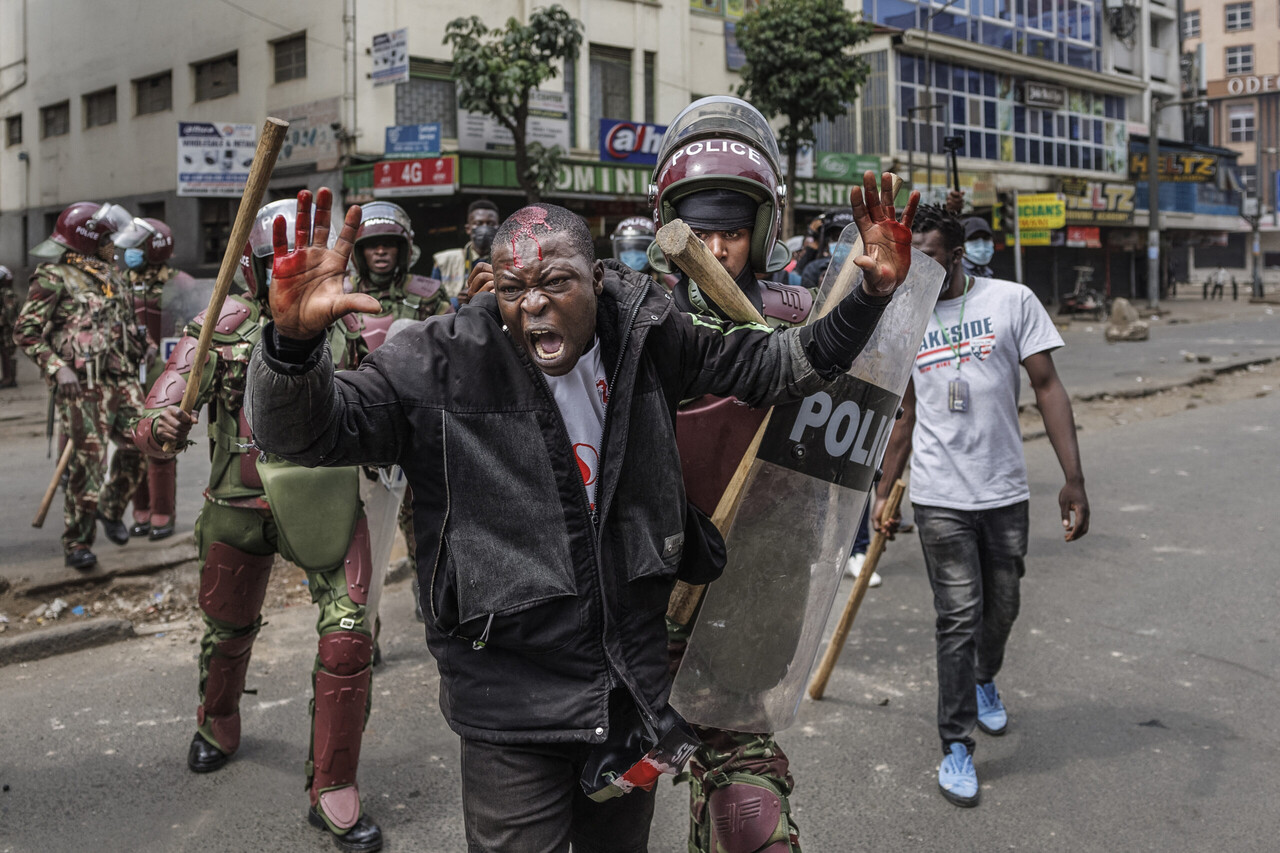Kenyan government reviews public servant salaries after deadly protests
 Wounded man is led away by police after he was detained on suspicion of being a looter during an anti-government demonstration called following nationwide deadly protests over tax hikes and a controversial now-withdrawn tax bill in downtown Nairobi, Kenya on July 2, 2024 (AFP Photo)
Wounded man is led away by police after he was detained on suspicion of being a looter during an anti-government demonstration called following nationwide deadly protests over tax hikes and a controversial now-withdrawn tax bill in downtown Nairobi, Kenya on July 2, 2024 (AFP Photo)
The Kenyan presidency announced Wednesday that it had ordered a review of salary increases for public servants in an attempt to calm tensions following a series of sometimes deadly anti-government protests.
Public frustration has surged over what protesters perceive as excessive government spending amid economic hardships and high living costs. The demonstrations, primarily led by Gen-Z Kenyans opposing proposed tax increases, have expanded into a broader movement demanding President William Ruto’s resignation and action against alleged corruption and extravagant spending by his administration.
Since the initially peaceful rallies began more than two weeks ago, dozens of people have been killed, with the police accused of using excessive force against protesters. This unrest represents the most significant challenge to Ruto since he took office in September 2022 in a nation often regarded as a stable beacon in a volatile region.
Tuesday’s protests once again turned violent, with police deploying tear gas against rock-throwing crowds. Reports indicated widespread looting and property damage, particularly in Nairobi and Mombasa, an opposition stronghold.
In a statement on X, Ruto’s spokesman Hussein Mohamed said the presidency has instructed the Treasury to review pay and benefits for state officials and lawmakers.
The announcement follows Ruto’s decision last week to withdraw the finance bill containing the unpopular tax hikes after the deadliest day of violence on June 25, which saw crowds ransack parliament as police fired live bullets at protesters.
“The president has emphasised that this is a time, more than ever before, for the executive and all arms of government to live within their means,” Mohamed said.
Ruto also pledged to eliminate allowances for the office of the first lady and the deputy president’s wife, a move that media reports suggest would save 1.2 billion shillings ($9.3 million).
The new salary structure for national and county public officers was scheduled to take effect on July 1, but details of the increases were not immediately available.
“It is not sustainable to have 900,000 public servants from both levels of government consume 1.1 trillion shillings ($8.5 billion) annually,” Public Service Minister Moses Kuria stated, noting that this amount equates to 47 percent of national revenues. “This leaves the rest of 54 million Kenyans with 53 percent, with debt servicing and development to cater for, among other expenditures.”
Kuria highlighted that under legislation adopted in 2012, the public wage bill should not exceed 35 percent of the national budget. “This is more of a moral and ethical issue than an economic issue,” he added.
Activists using the hashtag “RutoMustGo” have called for more rallies on Thursday, though it remains uncertain how widely their calls will be heeded after Tuesday’s violence. Some protesters have alleged that the violence was incited by “goons” who hijacked the demonstrations.
Police reported arresting more than 270 people posing as protesters who engaged in criminal activities on Tuesday.
“Security forces across the country singled out suspects found engaging in criminal activities in the guise of protesting, and took them into custody,” the Directorate of Criminal Investigations said in a statement on X late Tuesday. The police said they arrested 204 suspects in the Nairobi area and another 68 in other parts of the country.
The Kenya National Commission on Human Rights (KNCHR) has accused the police of using “excessive and disproportionate” force against the protesters. On Monday, KNCHR reported that 39 people had been killed and 361 injured during the two weeks of rallies but has not provided an updated toll since then.
The bloodshed has further fueled the demonstrators’ anger, undeterred by Ruto’s reversal on the tax hikes or his call for dialogue with young Kenyans. Ruto has maintained that the financial measures enacted by his administration are essential to keep the government functioning and to service a substantial public debt of approximately 10 trillion shillings ($78 billion), or about 70 percent of GDP.



